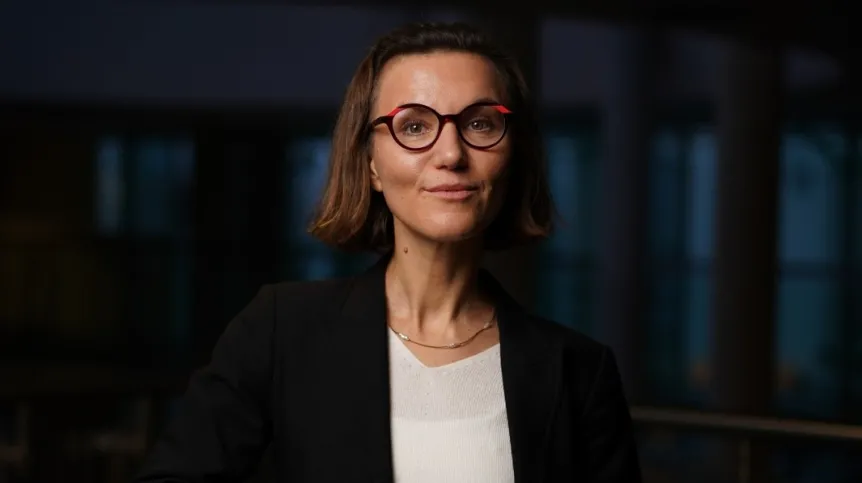
A staggering 96 percent of the time people spend online is spent on anything but consuming information. This, says Professor Magdalena Wojcieszak means ‘we have over-inflated the issue of information bubbles and disinformation.’
In November, Professor Wojcieszak from the University of California at Davis (USA) and the University of Warsaw received the prestigious ERC Consolidator grant of EUR 2 million. For five years, she will study the consumption of news media by Instagram, Tik Tok and YouTube users in the USA, Poland, Spain and England. Volunteers willing to take part in the study will install a tool in their applications that generates frequent display of social and political news. Wojcieszak will check how this will affect their views and online activity over time.
The researcher has previously carried out projects on the behaviour of Internet users in the USA, the Netherlands and Poland. The results of her work were published in such prestigious journals as Science and Nature.
Wojcieszak's analysis shows that 7,300 users observed for 9 months generated 106 million visits to various websites. Just over 3 percent of these were visits to news media websites, and most of them were not looking for information on social and political topics. Much more often, they wanted to check sports results, the weather, or how to cook a specific dish.
The problem of low consumption of social and political information is also visible on social media. This is partly due to the intentional actions of the owners of these companies. According to a report by Meta, the owner of Facebook, before 2018, the annual share of content from news media on this website reached 4.0%. After changing the algorithm, in 2022 this share dropped to 1.4%.
'My research results published in Nature show that only 6% of the content that Facebook users see on their profiles concerns social and political news (including the content of funny memes and reels). And only half of that content is consistent with their beliefs. It is easy to see that we have over-inflated the issue of information bubbles and disinformation,’ Wojcieszak says.
'Of course,’ she adds, ‘even a small group of users can have an impact on social life. An example is the attack on the United States Capitol in January 2021. But what puzzles me most is the overwhelming group of users who do not consume social and political content. Do they not click on it because it is presented in an unattractive way? Or because they do not believe that this knowledge has any impact on their lives?
In a study conducted on You Tube, Wojcieszak found that users did not pay any attention to regularly appearing banners with the following content: 'reading the news influences your financial decisions' and 'reading the news influences the quality of democracy in your country'.
However, when a special IT tool added content from the news media to the 'watched history', this content automatically appeared more often in the recommended column. Then users started to watch it and, interestingly, this did not reduce the time of their activity on the website.
'In 2018, Mark Zuckerberg changed Facebook's algorithm to limit content shared by the media in favour of content from friends and family. The idea was to give people a platform to enjoy. This was probably due to the fact that social media managers were afraid that if users encountered social and political content too often, their activity time on the website would decrease, which would result in a decrease in revenues from advertisers. My research on the YouTube platform shows that this is not true,’ says Wojcieszak.
The researcher is convinced that social media users need to be encouraged to consume social and political information. She hopes that the results of her research will be noticed by media managers 'who will finally stop repeating ad nauseum that people want to read and watch content that is light, easy and pleasant or sensational and polarizing'.
'Only 3 out of 10 consumed social and political materials come from the websites of media publishers. Maybe media managers will come to terms with the fact that perhaps a significant part of the public does not react to information content because it is presented in a wrong way. Maybe they will invest in a study measuring the Internet users' profile that drives all traffic in their media,’ Wojcieszak says.
She adds that she counts on the procedural support of the European Union.
'The grant is financed by the European Union, which regulates social media activities to a much better extent than the United States. Maybe I will be able to spark a debate on possible pressure on the heads of platforms to establish close cooperation with the media and require them to post more social and political content from reliable sources on their websites,’ Wojcieszak adds.
Professor Wojcieszak is a recipient of the ERC Starting Grant held at the University of Amsterdam, and has authored more than 80 publications in peer-reviewed journals. She serves as an editor of the Journal of Communication, and is a member of the editorial boards of seven peer-reviewed journals. Wojcieszak’s awards include the Young Scholar Award from the International Communication Association. This year, in recognition of her outstanding scientific achievements, she was elected ICA Fellow at the International Communication Association. (PAP)
Author: Urszula Kaczorowska
uka/ zan/ kap/
tr. RL













